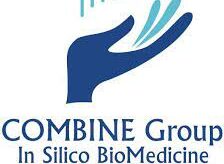Prof Francesco Pappalardo Explores Innovative In Silico Approaches at Biomathematics Workshop
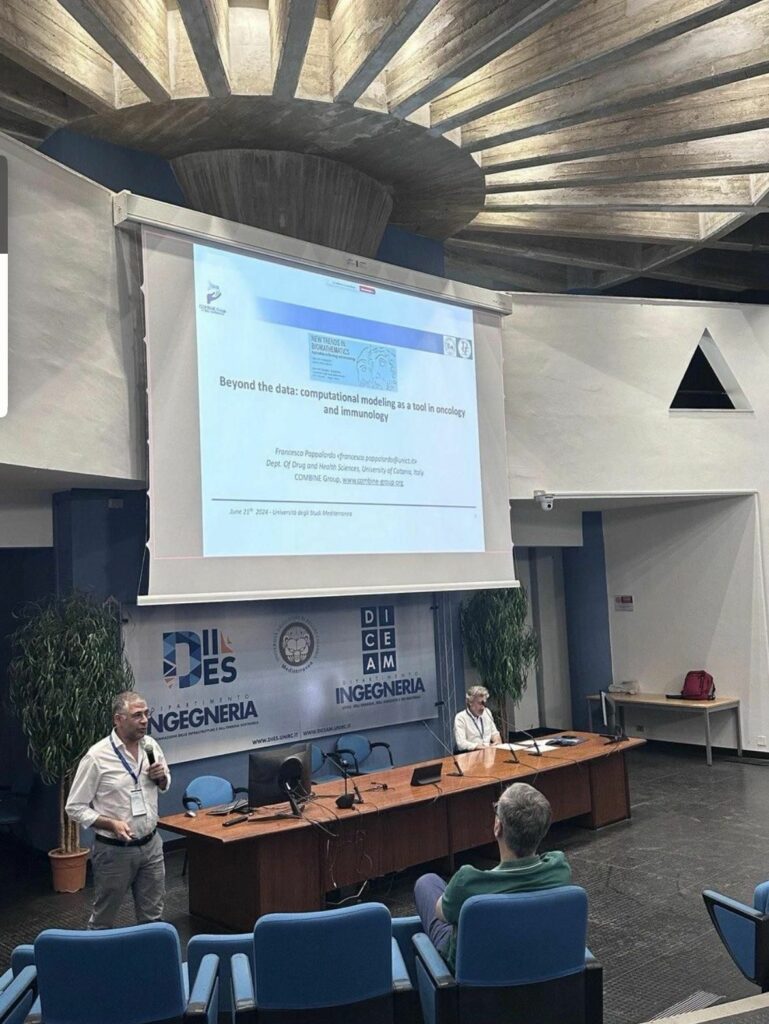
The workshop “New Trends in Biomathematics – Applications in Oncology and Immunology” was held today, June 21, 2024, at Università degli Studi Mediterranea di Reggio Calabria. This event brought together experts and enthusiasts from various fields to discuss the latest advancements in the application of mathematical models to medical research.
🎙️ Presentations by Prof. Francesco Pappalardo:
Beyond the Data: Computational Modeling as a Tool in Oncology and Immunology
Simulating to Predict: Computational Models in Infectious Diseases
Prof. Francesco Pappalardo’s presentations highlighted the transformative potential of in silico medicine, a field that uses computational models to simulate biological processes. These techniques promise to revolutionize healthcare by reducing the costs and time required for drug development.
🔹 Key Insights:
In Silico Medicine: Prof. Pappalardo illustrated how computational modeling can enhance our understanding of disease mechanisms, optimize drug development, and personalize treatments.
Revolutionizing Healthcare: By simulating clinical trials and predicting treatment outcomes, in silico methods offer a more efficient and ethical approach to medical research.
The workshop aimed to review the state of the art in mathematics applied to oncology and immunology, identifying emerging trends and strategies to advance the field. This gathering was of significant interest not only to experts in mathematical modeling and bioinformatics but also to doctors, biologists, and researchers in life and health sciences.
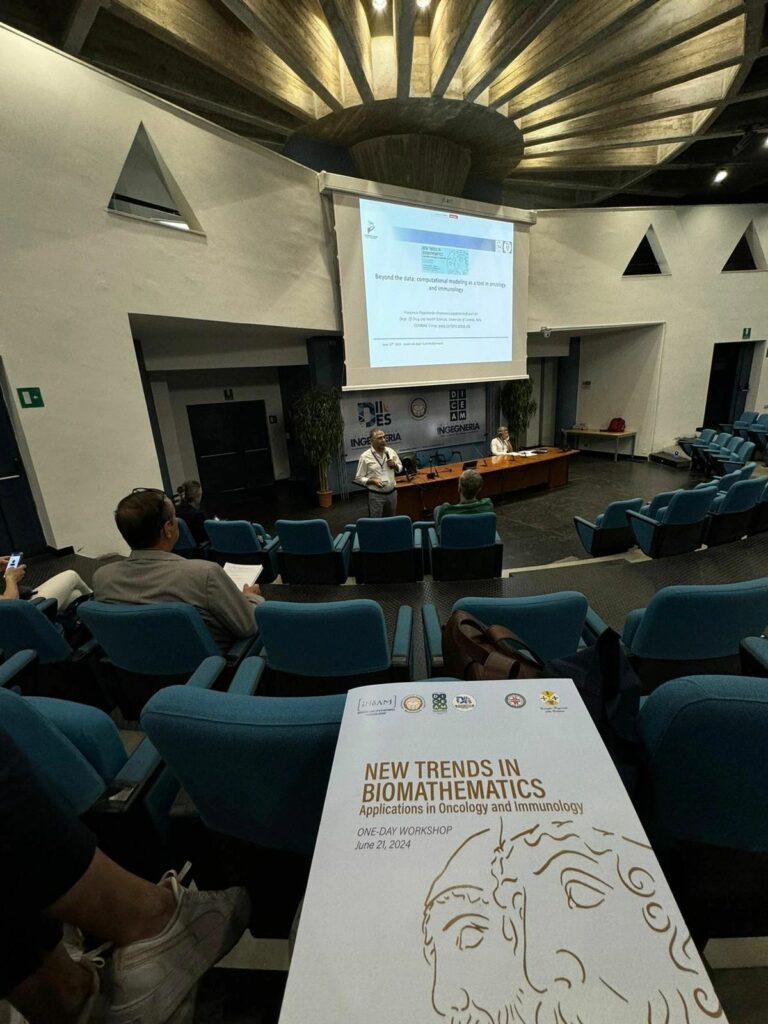
🔬 The event underscored the importance of interdisciplinary collaboration in pushing the boundaries of medical research. By integrating computational techniques with traditional medical practices, we can look forward to a future where healthcare is more precise, efficient, and personalized.
Stay tuned for more updates on the latest trends and breakthroughs in biomathematics and its applications in medicine.
Join Us for an Exciting Event on Pharmaceutical Research!
On Wednesday, May 15th, at 12:00 PM, in Classroom F (Building 2, University City), don’t miss the chance to meet Professor Francesco Pappalardo and Professor Giulia Russo from the DSFS! 🎓
🔍 Event Theme: “Impact of In Silico Trials on the Pharmaceutical World: Regulatory Challenges and Opportunities for Pharmaceutical and Health Sciences Students.” 📊
🧠 Discover the revolutionary Universal Immune System Simulator (UISS), developed by the Combine Group. This cutting-edge computational framework promises to transform the pharmaceutical industry! 💡
From predicting vaccination strategies to identifying molecular targets to overcome drug resistance, UISS offers a broad spectrum of possibilities that will revolutionize the future of pharmaceutical research. 💊
👩🔬 Students, especially those in the final years of their degree programs, are encouraged to attend and immerse themselves in this field of excellence from our department. Don’t miss out! 🚀
PharmaceuticalResearch #InSilico #UISS #DSFS #UniversityOfCatania
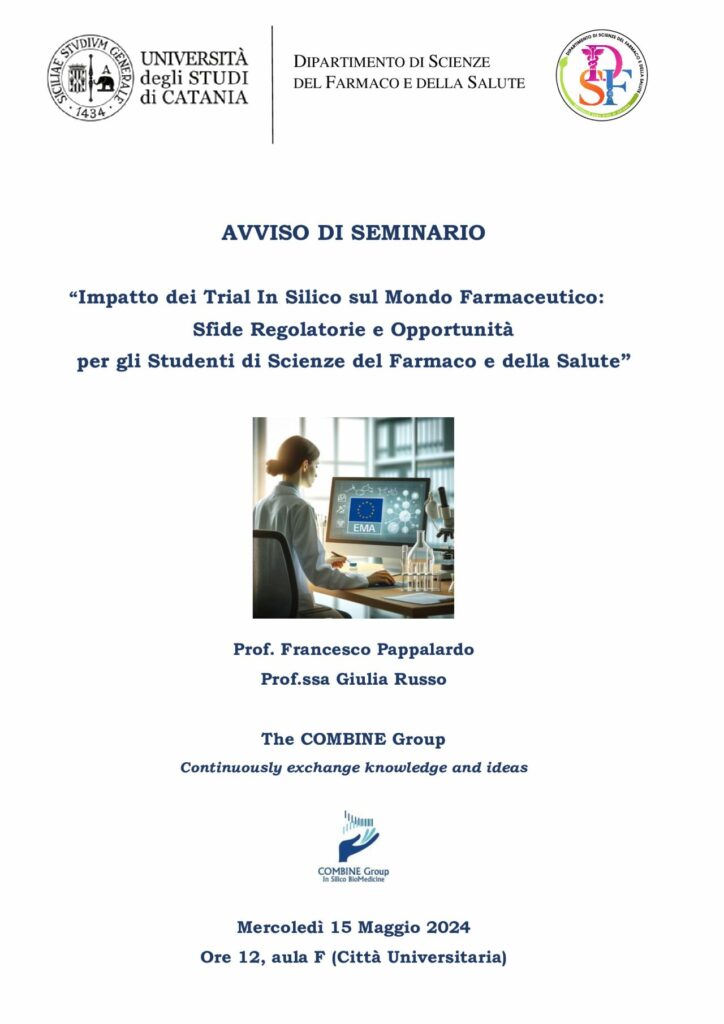
First annual meeting (Switzerland, 2024)
Welcome to our latest update on the groundbreaking initiatives in tuberculosis research! As we delve into the world of tuberculosis consortium partnerships, we are excited to share the progress made in developing novel therapeutic options, improving outcomes, and preventing relapse. Our collaborative efforts aim to bring about transformative changes in tuberculosis treatment, with a focus on shortening treatment duration.
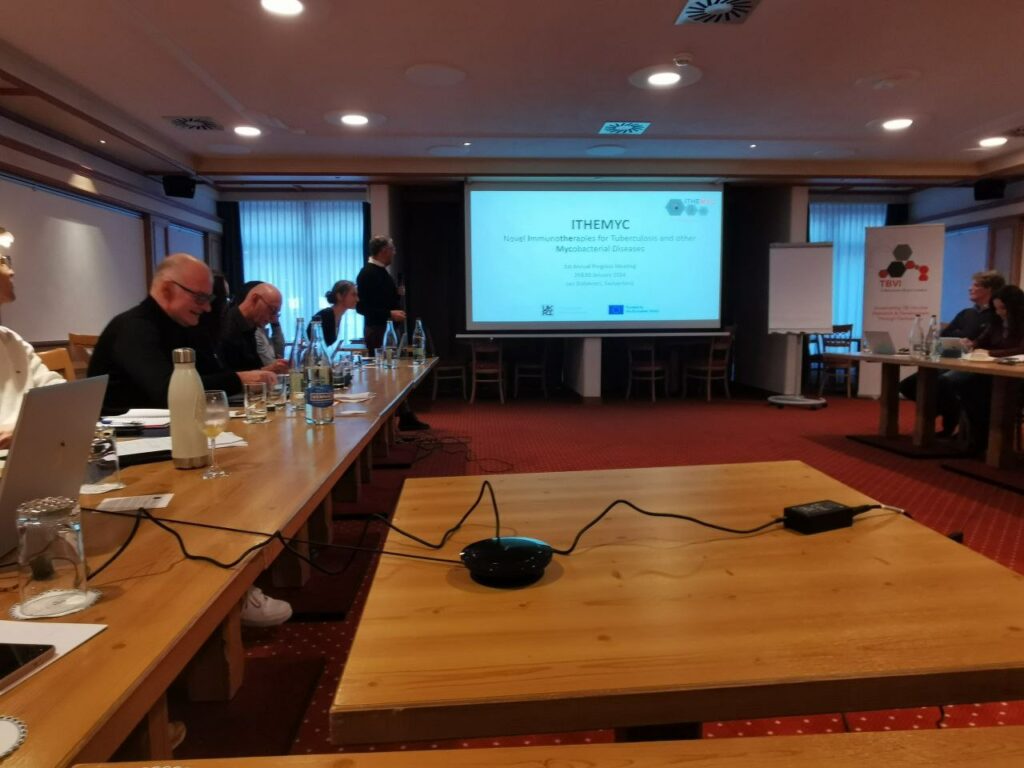
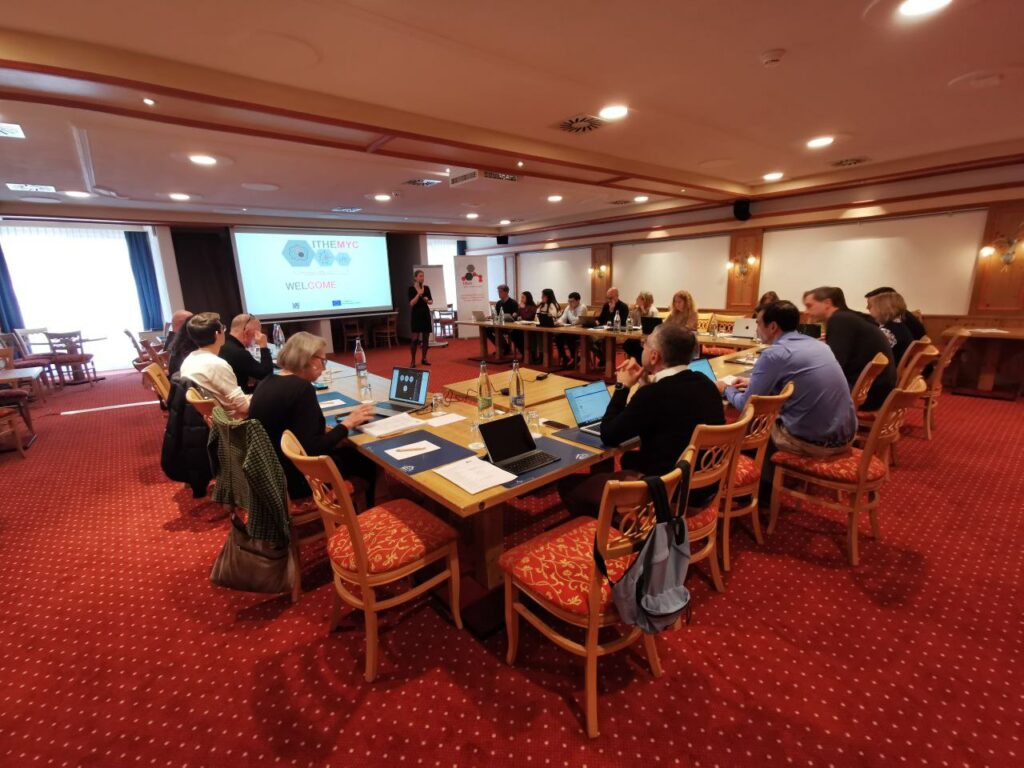
⚕ In Vivo Evaluation of Immunotherapies
A major focus of our research involves the in vivo evaluation of the most promising immunotherapies. By combining these therapies with traditional approaches like chemotherapy or therapeutic vaccines, we aim to enhance their efficacy and potentially shorten the overall treatment duration. This approach holds great promise in revolutionizing tuberculosis treatment protocols.
⚕ In Silico Modeling for Preclinical Progression
Harnessing the power of technology, our consortium employs in silico modeling to facilitate both in vitro and in vivo preclinical progression. This cutting-edge approach allows us to simulate and predict the therapeutic effects of potential treatments in the clinic. By utilizing advanced computational methods, we can streamline the research process, saving valuable time and resources.
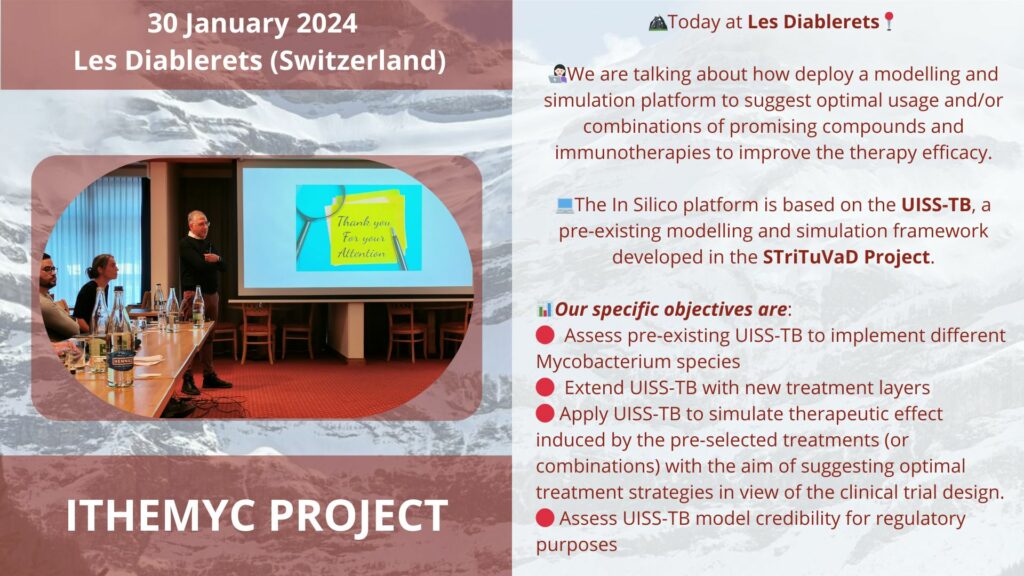
One of the Goals: Develop Novel Therapeutic Options
Our consortium is committed to pushing the boundaries of tuberculosis research by developing innovative therapeutic options. The goal is to create treatments that not only effectively combat the disease but also have the potential to significantly reduce the duration of treatment. By leveraging the collective expertise of our partners, we are exploring new avenues for drug development and testing.
⚕ Improve Outcomes and Prevent Relapse
Achieving better outcomes for tuberculosis patients is at the forefront of our collaborative efforts. We are dedicated to identifying strategies that not only cure the infection but also prevent relapses. Our consortium recognizes the importance of sustained recovery, and our research is geared towards finding solutions that ensure long-term success in tuberculosis treatment.
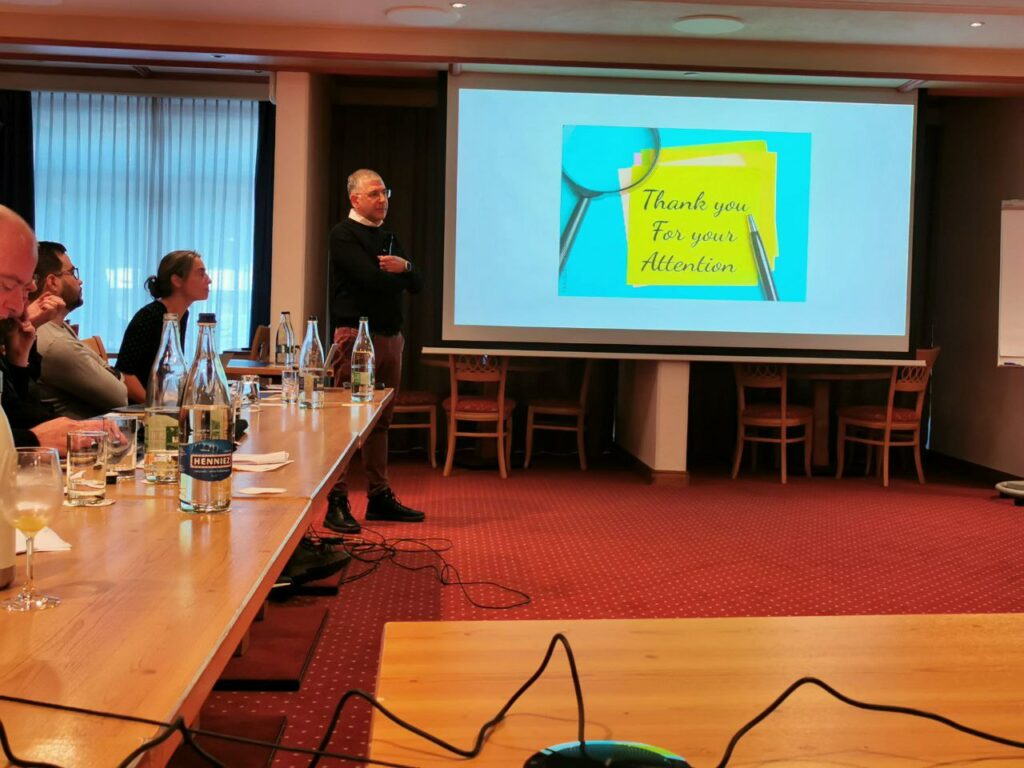
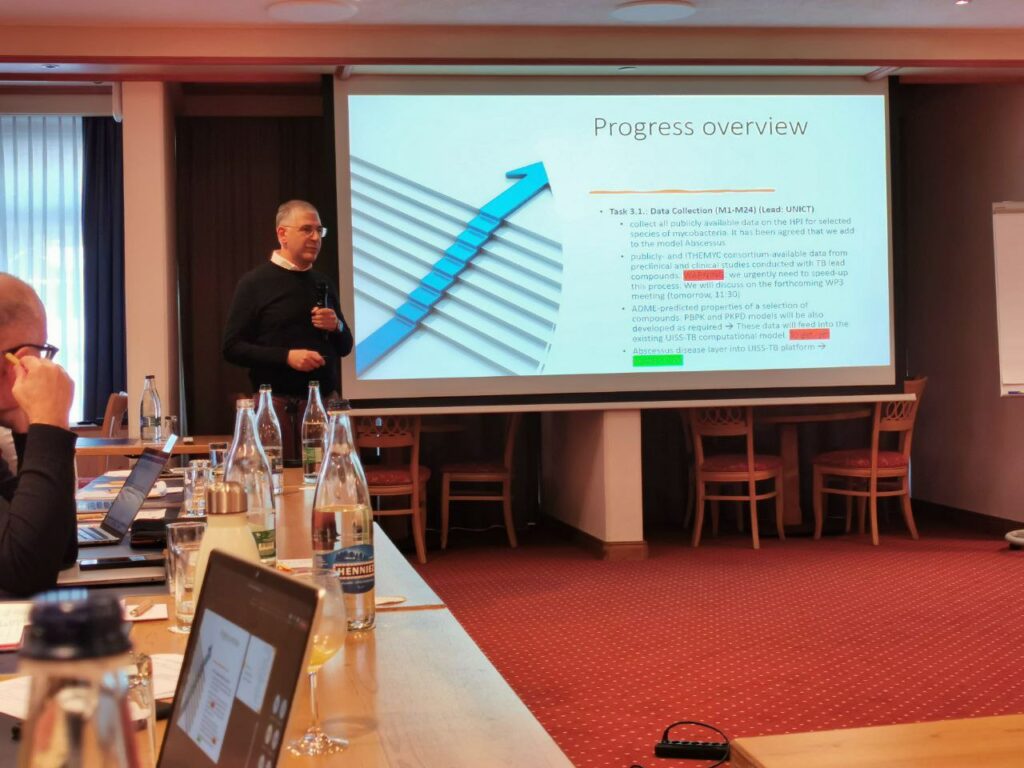
⚗ Reflecting on Achievements and Future Goals
As we come together to discuss the accomplishments of the past year, we express our gratitude for the opportunity to collaborate and make significant strides in tuberculosis research. Our consortium’s dedication to advancing the field is evident in the milestones achieved, from the development of novel therapeutic options to the successful in vivo evaluation of immunotherapies.
Looking ahead, our future goals include expanding our collaborative efforts, integrating new research findings, and continuously striving for innovative solutions to combat tuberculosis. We are excited about the possibilities that lie ahead and are confident that our collective endeavors will contribute to the global fight against this infectious disease.
In conclusion, our tuberculosis consortium is making significant progress in reshaping the landscape of tuberculosis research. By fostering collaboration, embracing innovation, and reflecting on our achievements, we are committed to bringing about positive change in the lives of those affected by tuberculosis. Together, we are on the path to transforming the future of tuberculosis treatment. Thank you for your ongoing support and partnership in this important endeavor.
Pint of Science 2023
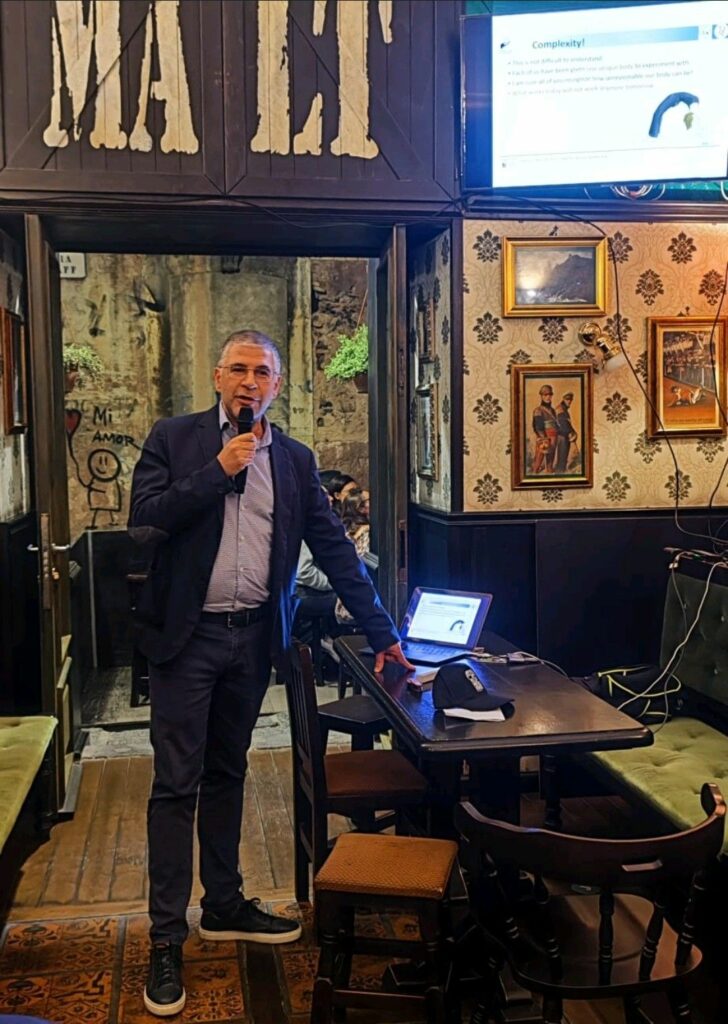
È possibile creare una replica digitale di un paziente, in grado di anticipare le variazioni nel suo stato di salute e fornire un valido supporto decisionale per la gestione clinica? Grazie agli avanzamenti nelle tecnologie informatiche di ultima generazione, oggi possiamo integrare e analizzare tutte le informazioni disponibili per un singolo paziente, consentendoci di predire l’andamento della sua salute in specifiche condizioni. Il Professor Francesco Pappalardo approfondirà questo argomento e altri aspetti affascinanti, il tutto in un’atmosfera informale, davanti a una piacevole pinta di birra
Sharper Night
Catania ha recentemente celebrato e sottolineato l’importanza della ricerca attraverso la partecipazione alla Notte Europea dei Ricercatori. La città ha ideato un ricco programma che abbraccia una vasta gamma di temi, spaziando dalla ricerca di base alle applicazioni tecnologiche in campi diversificati. L’interdisciplinarietà e le sfide per il futuro hanno guidato l’intero programma, creando un filo conduttore che ha accentuato la diversità e la portata delle iniziative presentate durante l’evento.
Event link: https://www.sharper-night.it/evento/conferenza-universita-imprenditoriale/

4 April 2023 – Les Diablerets (Switzerland)
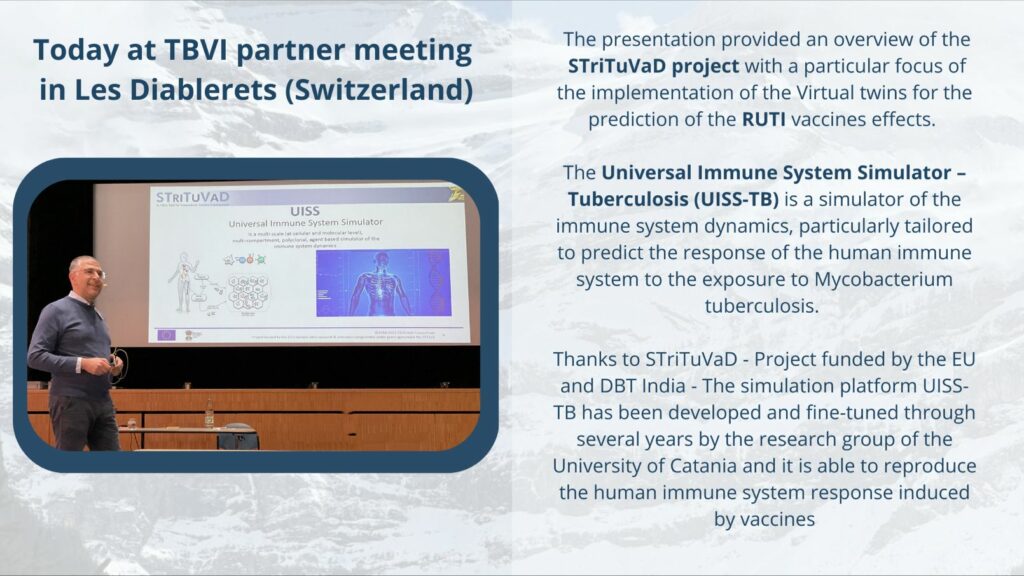
UISS, il paziente virtuale – Radio24 (IlSole24Ore)
Sono questi gli obiettivi cui punta un gruppo di ricercatori dell’Università di Catania con Uiss, il paziente virtuale. Uiss sta per Universal Immune System Simulator, è frutto di un quindicennio di lavoro degli scienziati catanesi e rientra a pieno titolo in quel settore della medicina computazionale.
Come dice il nome, parliamo di un software che è in grado di simulare il comportamento del sistema immunitario di un individuo (e anche di gruppi di individui, ognuno con caratteristiche immunitarie diverse) di fronte all’aggressione di un patogeno e in presenza di un farmaco. Già sperimentato su varie patologie, oggi viene applicato, non sorprendentemente, anche alla Covid.
Ospite Francesco Pappalardo, Professor in Computer Science del Dipartimento di Scienze del Farmaco dell’Università di Catania.
COVID-19, la ricerca accende i riflettori sull’argomento vaccini – Radio Fantastica
Su Radio Fantastica è intervenuto il Prof. Francesco Pappalardo docente di Informatica dell’Università degli Studi di Catania.
